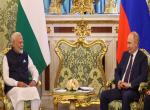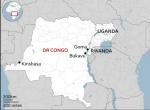Dr. Arvind Gupta, Amb D P Srivastava, High Commissioner of Rwanda to India Ernest Rwamucyo, Shri Tulsi Tanti, Distinguished Ladies and Gentlemen.
It is indeed a great pleasure for me to be present here for the inaugural session of ‘Enhancing India-Africa Cooperation’ organised by the Vivekananda International Foundation. Thank you for the invitation.
It will not be an exaggeration to say that our relations with Africa are at an all time high. Our engagement with Africa, which goes back into history, has now been back-stopped by strong and robust links in a range of areas. Our political, security, economic and indeed strategic engagement with Africa has been taken to a much higher trajectory in the recent past. This has, however, not happened in a vacuum. It has happened because both India and Africa, desire and work towards an even more meaningful and multi-dimensional partnership. A partnership should reflect the times we live in and should also be responsive to the needs and the aspirations of our countries. I would like to underline that with respect to India and Africa, this is already happening.
This is also a reason why Prime Minister Modi, in his speech before Ugandan Parliament, outlined the Ten Principles which will continue to guide India’s engagement with Africa. He stressed that Africa will be at the top of our priorities and our engagement will be sustained and regular. The fact that 26 visits at the level of the Hon’ble President, Hon’ble Vice President and Prime Minister have already taken place to Africa in the last four years, attests to this priority.
An area which has assumed a certain degree of urgency in the recent past has been defence and security. There is considerable mutuality of interest here. The rise of terrorism as the single most important factor affecting India and Africa has given an added thrust to this mutuality of security interest. African countries have themselves taken the initiative, individually and jointly, like G-5 Sahel and the Multi-national Joint Task Force etc. to tackle this menace. India’s contribution to promote security in Africa over the years is well known, including the yeoman service rendered by Indian Peace Keeping Force in Africa, since our first mission in Congo in 1960. 70 percent of the Indian peace keepers who have made the supreme sacrifice have laid down their lives in Africa. Consequently, it may come as no surprise that in the face of increasing cross border terrorism, piracy, armed robbery at sea, hijacking of ships, etc., India should be a natural partner with Africa to fight this together. Our bilateral security engagement with African countries has been substantially stepped up and we are now in a unique position of being able to share our expertise as well as experience on security issues.
As Prime Minister mentioned in the Ten Principles, we will strengthen our cooperation and mutual capabilities in combating terrorism and extremism; keeping our cyberspace safe and secure; and support the UN in advancing and keeping peace. We will also work with Africa to keep the oceans open and free and work together to ensure that Africa does not once again turn into a theatre of rival ambitions.
Friends, on another note, we now have one of our most robust relations with Africa in development partnership as well as in trade and investment. The economic indicators are clear that the macro-economic policies being implemented in many countries of Africa are bearing fruit. Contradictions may remain. As the Namibian President said, “Africa consumes what it does not produce and produces what it does not consume”. India can certainly help correct this anomaly without in any way disrupting the economic or the financial well being of the African countries and without distorting their national priorities.
In his Ten Principles, our Prime Minister was clear that our development partnership will be guided by African priorities and that it will be on terms that will be comfortable for Africa, which will liberate the potential of Africa and not constrain its future. We will rely on African talent and skills, build local capacity and create local opportunities. Currently, we are implementing 180 credit lines worth over USD 11 billion in over 40 countries. We have just signed a grant agreement to build the first of the Mahatma Gandhi Convention Centres in Niger in time for the AU Summit to be held next year in Niamey. It is important to underline the fact that we are ensuring that our terms of assistance do not burden the country concerned or result in its indebtedness or infringe on its sovereignty but is entirely demand-driven and fits in with their priorities. India and Africa present an exemplary model for South-South cooperation.
The Prime Minister also indicated that India will keep its markets open to make it easier and more attractive to trade with us. And that we will support our industry to invest in Africa. Indian companies have invested over US$ 54 billion. India has also focussed on the SMEs sector in Africa, including in setting up of Entrepreneural Development and Business Incubation Centres. Our trade with Africa jumped by 21 percent this year. Africa’s exports to India are growing. Since sub regional and regional integration in Africa, and now the continental integration under FTA, have been gaining momentum, India is willing to play the role of an important partner in this emerging scenario. Our private sector has been playing a pivotal role in this context and will enhance their presence. I am, therefore, pleased that many of the issues being taken up for discussion in this conference are economic, finance and commerce related. You have tried to focus on the road blocks like transport and logistics costs, finance etc, which is crucial in taking this aspect of our engagement higher. It will also interest you to know that the first India-West Africa Business Conclave is going to be held on 8-9 October 2018 in Abuja, Nigeria where our Commerce and Industry Minister and MOS for External Affairs MJ Akbar will be attending.
Friends, just two weeks ago, External Affairs Minister witnessed the signing of the MoU between my Ministry and TCIL to establish the second phase of the Pan-African e-network for tele-education and tele-medicine, e-Vidyabharati and e-Aarogyabharati between India and Africa. This is a much more ambitious phase with ramped up technology, user-friendly interface, greater coverage, closer interface between institutions and enhanced monitoring. This is also in keeping with the Ten Principles, which is to harness India’s experience with digital revolution to support Africa’s development, particularly in education and health, and mainstream the marginalised. India would be happy to equip the youth of Africa for their place in the digital age.
You are aware of the extensive capacity building and training programmes which we have undertaken in Africa encompassing interalia cutting edge science, technology innovation and research. Every year, over 8000 African youth are trained in a diverse set of programmes, including in our flagship programme ITEC. This only goes on to show that the more and more one tends to measure partnerships purely in monetary terms, the less and less do we really capture the nature and depth of relations between countries. The Indian e-visa facility has been extended to cover more than 25 African countries though there is much more we can do by way of enhancing air-connectivity between India and Africa. We are confident that with the opening of 18 new Missions in Africa, India’s physical presence will substantially increase.
Friends, Africa is on the move and India will continue to play its role to contribute to Africa realising its full potential.









Post new comment